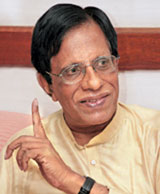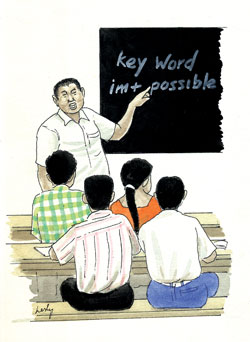English anguish
 ‘Our own experience shows,’ President Mahinda Rajapaksa told the 9th
International Language and Development Conference on Language and Social
Cohesion on Monday, ‘that language can be an instrument of division and
conflict.’ ‘Our own experience shows,’ President Mahinda Rajapaksa told the 9th
International Language and Development Conference on Language and Social
Cohesion on Monday, ‘that language can be an instrument of division and
conflict.’
He continued that Sri Lanka is trying use language to bind our people
together. The government is committed to securing the language rights of
all communities and to transforming the country into a trilingual
society, and English was to be used as a link language.
|

Sunimal Fernando |
What President’s words entail is the conversion of a multilingual
society made up of essentially monolingual communities into one
comprised of one multilingual community.
That this is possible is proved by the existence already of
multilingual language communities, for instance Bohras, Malays and
Sindhis - who, in addition to their mother tongue, speak English, and
the two main languages of this land.
Language policy
Now, the learning of English in Sri Lanka has been fraught with
impediments, not the least of which is that caused by myth.
For example, the language policy of 1956 has been blamed for the
alleged decline in English knowledge. The truth is that, at that time
only five percent of the population were proficient in English, the then
official language, whereas the figure was 13 percent two decades later.
This is despite the fact that, as part of the ‘brain drain’, a
substantial proportion of the English speakers of this country had
sought fresh pastures abroad. Significantly, about half the Burgher
community, who speak English as their mother tongue, migrated to
Australia.

The major impediment to English learning has been the absence of
teachers proficient in the language, and the brain drain has not helped.
It was for this reason that in the 1970s a commission found that
comprehensive teaching of English from Year One was not feasible.
Insufficient resources
To increase the number of English teachers it is necessary to have a
larger pool of English speakers. It was for this reason that in the
mid-70s Shakespeare was abandoned in school textbooks in favour of the
more relevant (and more easily understood) Bob Dylan.
The commission also found that there were insufficient resources
available for translation into Swabasha to keep pace with the rapidly
changing pace of technology - an indispensable requirement for a
relevant tertiary science education curriculum.
However, it is another myth is that people learn English in order to
better their education and skills - which laudable aim is the avowed
policy of the government. In actual fact they do so to enhance their
employment opportunities and their status.
A candidate for employment, proficient in English stands a 100
percent chance of getting a job, and at a salary on average two to three
times higher than that of a non-speaker. This is because, language
policy or no language policy, English remains the language of commerce.
As for status, the elite in this country use English as a social
excluder. The non-English speaker was a ‘Yakko’, a ‘Sarong Johnny’ or a
‘Bolawathi’; even the wealthiest remained a ‘Mudalali’ - although his
children might achieve the desired status after learning the Queen’s
tongue.
English-speaking elite
The de facto official language of this country, notwithstanding
constitutional provisions, has remained English, simply because it is
the jargon of the elite. It remains the lingua franca of the public
service; and, ironically, even of the legal draughtsman.
English is a fetish commodity, a possession to be acquired by those
desirous of status. This in turn has led to the formation of bastardised
argot of the Sinhala language, meant for those who may possess an
English vocabulary but no knowledge of how the grammar works.
This argot inserts strings of English words into essentially Sinhala
sentences.
It may have arisen from the habit of native English speakers, when
speaking the vernacular, of inserting an English word or phrase when
they have difficulty remembering the vernacular equivalent.
International arena
It was (and remains) customary for the English-speaking elite to
laugh at errors made by those less adept. This has been a most serious
hindrance to people developing their English skills: they were simply
afraid to speak, an enormous drawback in learning a language. This fact
lies at the heart of debate about the use of ‘Standard Sri Lankan
English’. The English spoken in this country varies quite considerably
from that of Oxford or London or Manchester. It is spoken much faster,
has its own idiom and is virtually incomprehensible to an outsider.
The approach of the government, personified by Presidential advisor
Sunimal Fernando, has been to get English proficiency out to as many
people as possible.
This necessitates the use of Sri Lankan Standard English. This has
been basic premise behind ‘Speaking English Our Way’ - which aims to
free students of the fetters of the ‘correct’ pronunciation. We must be
able to walk before we can run; we must be able to talk before we can
enunciate ‘properly’.
It could be argued that the use of Sri Lankan English trammels
communication with the outside world. This is, to a certain extent,
true.
However, this has certainly not stopped Scottish people, for example,
from speaking in their own bewildering dialect.
In the international arena, we no longer need to communicate
principally with native English speakers from Britain or the USA. Our
own dialect is sufficient for talking (albeit with some difficulty) to a
Chinese or a Russian or a Qatari.
The development needs of this country demand the use of English as
spoken by a Sanath Jayasuriya rather than by a Kumar Sangakkara. The
acquisition of social status, on the other hand, requires it to be the
other way around. |



